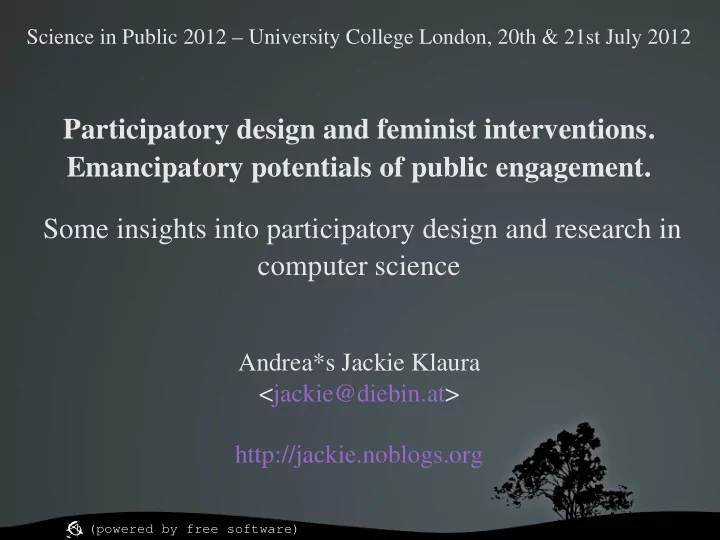

Science in Public 2012 – University College London, 20th & 21st July 2012 Participatory design and feminist interventions. Emancipatory potentials of public engagement. Some insights into participatory design and research in computer science Andrea*s Jackie Klaura <jackie@diebin.at> http://jackie.noblogs.org (powered by free software)
Public engagement? Science in public ↔ publics in science Lot of work in STS since participatory turn (Jasanoff 2003) Usually framed on policy level (cf. Lengwiler 2011) Non-scientists participate in facilitated debates Few notable instances where participation happens on level of technoscientific practices
Some concepts Participatory design and research, primarily in: Computer Supported Collaborative Work (CSCW) Human-Computer Interaction (HCI) Participatory Design (PD) Terminology: technoscientific practices technoscientific research participatory design participatory research
Situating my research Hybrid identity: socially aware computer scientist? or technically interested social scientist / STSer? Inseparable entaglements: Ethico-onto-epistemological issues (Barad 2007) Participatory Design as some form of common ground
My research approach Situational Analysis (Clarke 2005) of construction of publics in: CSCW, HCI and especially PD Informed by: feminist theory & critiques from informational & computer science and STS (Star 1991, Wagner 1994, Suchman 2002, Wyatt 2003, Bath 2006, ...) STS research on public engagement (Kleinman 2000, Irwin 2001, Stirling 2008, Michael 1992 & 2009, Theories of publics and public spheres Felt & Fochler 2010, ...) (Arnstein 1969 & 1975, Habermas 1974, Fraser 1990, Mouffe 1999, Benhabib 2002, ...)
Research questions How are different publics constructed as relevant? How are they integrated into the research projects? Who gets to participate? When do they get to participate? What is the aim of letting publics participate in technoscientific research?
Project status 5 interviews so far with PD researchers who conduct participatory approaches As well as reports and theory and method papers Theoretical synthesis of feminist theory / STS / ICT 3 more interviews will follow full analysis until September 2012 final thesis until October 2012
Researcher/Developers vs. Publics/Users? Traditional divide between users and developers Deconstructed esp. by critical and feminist researchers in STS and computer science (Haraway 1991, Harding 1993, Suchman 2002, Wajcman 2004, Bath 2006, Barad 2007, ...) Participatory Design researchers in exchange with STS knowledges & practices (Wagner 1994, Suchman 2002, Sengers et al. 2005, Bath 2006, ...)
Participatory Design (PD) in Computer Science Originated from the Scandinavian approach to systems design in the 1970ies and 80ies Motivations: Democratization of technology & 'better' systems
Participatory Design (PD) in Computer Science Originated from the Scandinavian approach to systems design in the 1970ies and 80ies Motivations: Democratization of technology & 'better' systems “Better systems. I think this is a rather simple answer. To just develop systems that are really supporting their users. (…) What are better systems? Here we probably would say that this is only exposed in the use situation. Of course then value questions will be exposed.” (I2 R.14)
Participatory Design (ctd.) Diverse forms of approaches Early participation of publics / stakeholders / users Participation facilitated through: Prototypes Mock-ups Interviews, Observations & Ethnomethodology (Future) Workshops & Focus Groups and many more...
Restraints on participation Early and ongoing participation should be achieved but first the research endeavour has to sketched out and funding for the planned research has to be aquired → preframing of participation Preframing of publics also through: only certain publics have resources to participate only certain publics respond tools, methods & spacio-temporal context Marginalization of participatory approaches
Conclusions Why investigating PD from STS perspective? Strong focus on participatory design, much less on participatory research Potential for PD: engage in policy debates Strong use of and engagement with STS and other social sciences & humanities; rich in experiences with participation on a practical level Potential for STS & Co: rework our frameworks of participation Awareness for diversity of publics and conflicts in participation
critique / feedback / advice ? Andrea*s Jackie Klaura – jackie@diebin.at Research Web-Log: http://jackie.noblogs.org this presentation including the transcript and full references will also be available on the blog (powered by free software)
Recommend
More recommend